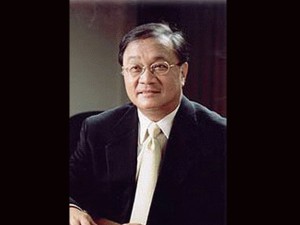Overturn ruling on PLDT ownership, Philippine tycoon asks SC

MVP ON THE WARPATH. The framers of the 1986 Constitutional Commission was comprised of intelligent men and women fluent in English and keen to make their intentions clear.
MANILA, Philippines – Businessman Manuel Pangilinan has asked the Supreme Court to reverse its decision on how much local telecommunications behemoth Philippine Long Distance Telephone Company (PLDT) can be owned by foreigners.
In a 50-page motion for reconsideration filed last July 15, Pangilinan claimed that the SC ruling sends a wrong signal to investors planning to put stakes in the Philippines. He warned the high court of the consequences of its redefinition of the term “capital” found in Section 11, Article XII of the 1987 Constitution.
“If the Court does not reconsider, that unwarranted redefinition will have very serious adverse repercussions for the partially nationalized industries affected, the Philippine capital market, the Philippine economy in general and the country as a whole. There will be no telling if and how those severe consequences can be survived,” said Pangilinan.
In a decision last June 28, the high court said the term “capital” refers to common shares, which entitle a holder to participate in the voting for the firm’s directors. The SC clarified that the term “capital” does not refer to the total outstanding capital stocks, which constitute common shares and non-voting shares.
Applying the SC’s definition, this means that PLDT exceeded the maximum 40-percent foreign ownership in public utilities allowable under the Charter because foreigners “unmistakably” control more than 64 percent of the firm’s common shares.
“In other words, foreigners hold 64.27 percent of the total number of PLDT common shares while the Filipinos hold only 35.73 percent. Such amount of control unmistakably exceeds the allowable 40 percent limit on foreign ownership of public utilities expressly mandated in Section 11, Article XII of the Constitution,” the SC decision stated.
Article continues after this advertisementAside from Pangilinan, PLDT President Napoleon Nazareno, and the Philippine Stock Exchange (PSE) filed their separate motions seeking a reversal of the high court’s decision and asked that a temporary restraining order and/or writ of preliminary injunction be issued to stop the SEC from conducting its investigation.
Article continues after this advertisementThe respondents, in their motions, said that the ruling that foreigners may own up to only 40% of a public utility’s voting stock (instead of up to 40% of its entire capital stock) “is not justified: by the text of the Constitution; the clear intent of the 1986 Constitutional Commission that drafted it; nor by the economic conditions confronting the country.”
The separate motions explained that the high court decision was based on a misreading of Section 11, Article XII of the 1987 Constitution when it ruled that the term “capital” in that section referred only to “voting stock”, thus justifying the reduction of the allowable investments for foreigners in partially nationalized activities from 40% of total “capital” to only 40% of “voting shares” because Section 11 explicitly says “capital” not “voting shares.”
The motion stated that the 1986 Constitutional Commission was comprised of intelligent men and women fluent in English and keen to make their intentions clear. They would not have used the general term “capital” if they wanted to refer only to “voting shares”.
Pangilinan said the reason why the framers of the constitution rejected the use of the term “voting capital” or “controlling interest” instead of “capital” because they are aware of the “dire economic condition and pressing need for investments, and wanted to find ways to attract and keep, rather than drive away foreign capital.”
“This meant they did not want to adopt additional restrictions such as limiting allowable foreign ownership of voting stock to only 40 percent rather than 40 percent of total capital in partially nationalized industries,” Pangilinan averred.
Pangilinan also questioned the high court’s jurisdiction to rule on the petition of lawyer-accountant Wilson Gamboa, who had wanted to annul the sale of government-acquired 111,415 PLDT shares to Hong Kong-based First Pacific Co. Ltd. which is affiliated with Pangilinan. At the time of the transaction, the shares were valued at P25.2 billion and sold by PTIC.
He likewise asserted that the SC had a “clear lack of jurisdiction” in handling Gamboa’s petition which was filed in 2007.
“The 1987 Constitution does not give the Court jurisdiction to entertain petitioner’s declaratory relief application and the [SC] Majority may not get around the constitutional limits to the Court’s jurisdiction and powers by considering that declaratory relief application as a mandamus petition,” the businessman said.
Declaratory relief is a legal remedy where one party asks the court to determine that party’s rights as regards an action between two other parties, as in Gamboa’s petition, the government’s rights in the sale between First Pacific and PTIC. On the other hand, mandamus is a legal remedy for the courts to direct a government body to perform a ministerial duty.
Also in his appeal, Pangilinan said that SEC is not a party to the case because only former SEC chair Fe Barin was impleaded as a respondent.
“Impleading her is not impleading the SEC. The SEC is a collegial commission belonging to the executive branch of government which should itself have been impleaded as the proper public respondent,” Pangilinan said.